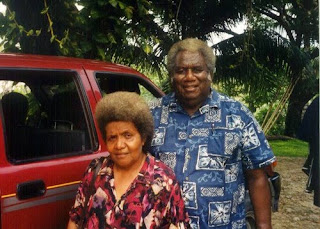 |
| The Solomon Islands High Commissioner to Papua New Guinea, His Excellency Mr Bernard Bata’anisia |
The Solomon Islands High Commissioner to Papua New Guinea, His Excellency Mr Bernard Bata’anisia today received a cheque of K3.0 million (SBD8.4 million) for payment of tuition fees for the Solomon Islands students currently studying at various tertiary insitutions in PNG.
The K3.0 million Education Grant Assistance for the 2010 academic year is part of the K23.0 million pledged by the PNG Government in 2006 to assist the Solomon Islands Government in the construction of its Chancery in Port Moresby, as well as provide assistance in sponsorship and training of selected Solomon Islands students in PNG tertiary institutions and colleges.
The Acting Secretary of the Department of Foreign Affairs and Trade, Ambassador Lucy Bogari handed over the grant funding to Mr Bata’anisia during a short ceremony in Waigani.
The Acting Secretary said that the Government of PNG was very pleased to extend the assistance to its closest neighbour and friend. The grant assistance continued the Government of Paua New Guinea’s previous commitment of providing technical assistance to Solomon Islands. The assistance is also in direct response to a request made by the Solomon Islands Government.
The Assistance also honours the commitments on cooperation agreed between the two countries under the Memorandum of Agreement relating to existing Development Assistance to Solomon Islands signed in 2006.
Upon receiving the Grant Assistance, His Excellency Mr Bata’anisia expressed his gratitude on behalf of the Solomon Islands Government to the people and the Government of Papua New Guinea for facilitating the Grant Assistance.
“Education and training has linked our two countries together and further strengthening of our bilateral ties”, Mr Bata’anisia said.
He said there are about 285 students in 2010 who are sponsored under this grant assistance with the numbers continue to grow over the years because of the Grant Assistance.
“The assistance will no doubt go a long way in meeting the manpower and the training needs of Solomon Islands”, Mr Bata’anisia said.
Mr Bata’anisia said Solomon Islands is a young and developing country and such training of its human resources is a top priority for the government.
“Therefore the contribution of the Paua new Guinea Government in our endeavours is timely and appreciated by the Government and people of Solomon Islands”, he said.
He said the K3.0 million funding will go towards meeting the cost of tuition fees for the students while part of the funding assistance will go towards the funding of the new Solomon Islands High Commission Chancery in Port Moresby.











